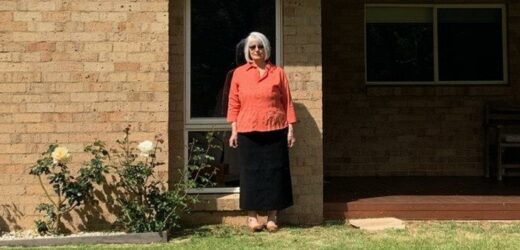Waiting times to have a dispute heard at the Victorian legal tribunal – which is tasked with being “timely and efficient” – have stretched to months and, in the worst cases, years.
Renters were hit particularly hard by delays at the Victorian Civil and Administrative Tribunal in 2022, with disputes between landlords and tenants taking months to be heard rather than a few weeks, as was once the case.
Margaret Singleton at her Lakes Entrance home. A dispute over the home will not be heard by VCAT until 2024.
In the longest delays to rental disputes, the tribunal took 22 weeks or more to hear cases, according to its latest annual report tabled in state parliament just before Christmas.
A tribunal spokeswoman said the increase in time taken to hear cases was largely driven by more people using the tribunal due to improved accessibility through online hearings. More people taking part via online hearings also extended the length of cases, she said.
Tribunal president Justice Michelle Quigley and chief executive Mary Amiridis confirmed case backlogs had worsened in the past year and said in the report this was driven by large numbers of members retiring, “and longer hearing times for cases arising from legislative changes”.
Disputes over rental properties heard at the tribunal mostly relate to tenant bonds not being returned or compensation sought by landlords for the damage done to homes.
“We recognise the financial impact and the stress of waiting to have these cases heard,” the tribunal spokeswoman said.
The rental dispute hearings list is the tribunal’s highest volume area, and it saw a 37 per cent increase in unheard cases on the previous financial year.
The spokeswoman said there was a focus on reducing case numbers in the rental dispute area. “We know [the delay] seriously impacts many Victorian renters and landlords,” she said.
Housing cases involving issues of safety, homelessness and urgent repairs were being prioritised “as are other case types including, for example, applications for possession for unpaid rent”, she added.
Waits for hearings over building disputes were even longer, with a median delay of more than eight months. One woman with a long-running building dispute has had her case – originally scheduled to begin in August this year – delayed until October 2024.
Margaret Singleton lives in Lakes Entrance and has been involved in a gruelling legal battle with a building surveyor and building authorities over who was responsible for problems with the home she and her husband built more than a decade ago.
Singleton’s husband died in 2017, and she was looking forward to a final showdown in the tribunal against the surveyor in August. But the tribunal has re-listed the hearing for 2024.
“At 76 years of age, time is not something I have in abundance,” Singleton said. “The delays to my case being heard total 39 months.”
Singleton said that, along with causing her “relentless stress and worry”, the delays were unacceptable because they meant building companies could deliberately stall proceedings “to avoid being held accountable”.
The tribunal spokeswoman declined to comment on Singleton’s case, saying individual hearings could not be discussed.
“In general, cases requiring long hearings of five days or more will often have an extended wait owing to scheduling constraints,” the spokeswoman said.
Singleton’s hearing is expected to run for 10 days.
The report shows hearings in the tribunal’s administrative division, which deals with professional conduct disputes, reviews of decisions made by government authorities like Freedom of Information, and fights between lawyers and their clients, took a median time of 33 to 35 weeks to resolve – up from 17 to 21 weeks before the pandemic began.
The part of the tribunal dealing with property disputes, small civil claims and Owners Corporation issues in apartments had median wait times for cases ranging from 15 weeks in the best case to 38 weeks in the worst.
The planning and environment division, which largely hears disputes over property development, had median wait times of 33 weeks before cases were resolved. The report also shows that the top three suburbs where disputes over development were brought before the tribunal in 2021/22 were Brighton (26 cases), Hawthorn (25) and Richmond (23). The councils involved in the highest number of planning disputes were Mornington Peninsula Shire (88 cases), Yarra Council (87) and Boroondara (84).
The Age asked the tribunal to supply information on the longest delays in each of its divisions, but the spokeswoman said it was not possible to answer this question in time for publication.
She also said that in the months since the period covered by the annual report had finished, wait times for cases to be resolved had dropped slightly. “The median length of time taken to finalise cases in our planning and environment list … has reduced to 27 weeks in the current financial year to date.”
Most Viewed in Politics
From our partners
Source: Read Full Article



